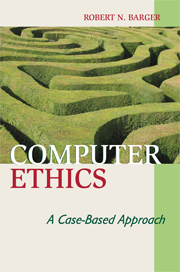Book contents
- Frontmatter
- Contents
- Preface
- Acknowledgments
- 1 Introduction
- 2 The Computer as a Humanizing Agent
- 3 Philosophic Belief Systems
- 4 A Philosophic Inventory
- 5 The Possibility of a Unifying Ethical Theory
- 6 The Ethical Decision-Making Process
- 7 Psychology and Computer Ethics
- 8 The Computing Field as a Profession
- 9 Computer-Related Codes of Ethics
- 10 Computer Ethics and International Development
- 11 Robotics and Ethics
- 12 Theft and Piracy Concerns
- 13 Cases Concerning Theft and Piracy
- 14 Privacy Concerns
- 15 Cases Concerning Privacy
- 16 Power Concerns
- 17 Cases Concerning Power
- 18 A Miscellaneous Collection of Cases
- 19 Parasitic Computing Case
- Appendix: Topics for Presentations, Discussions, and Papers
- Notes
- Selected Bibliography
- Index
9 - Computer-Related Codes of Ethics
Published online by Cambridge University Press: 05 June 2012
- Frontmatter
- Contents
- Preface
- Acknowledgments
- 1 Introduction
- 2 The Computer as a Humanizing Agent
- 3 Philosophic Belief Systems
- 4 A Philosophic Inventory
- 5 The Possibility of a Unifying Ethical Theory
- 6 The Ethical Decision-Making Process
- 7 Psychology and Computer Ethics
- 8 The Computing Field as a Profession
- 9 Computer-Related Codes of Ethics
- 10 Computer Ethics and International Development
- 11 Robotics and Ethics
- 12 Theft and Piracy Concerns
- 13 Cases Concerning Theft and Piracy
- 14 Privacy Concerns
- 15 Cases Concerning Privacy
- 16 Power Concerns
- 17 Cases Concerning Power
- 18 A Miscellaneous Collection of Cases
- 19 Parasitic Computing Case
- Appendix: Topics for Presentations, Discussions, and Papers
- Notes
- Selected Bibliography
- Index
Summary
The Center for the Study of Ethics at the Illinois Institute of Technology lists on its Web site forty-seven current codes of ethics relating to computing and information systems. Two of these codes that pertain to large numbers of professionals in the computing field are the ACM (Association for Computing Machinery) Code of Ethics and Professional Conduct and the Software Engineering Code of Ethics and Professional Practice. The latter code is a joint project of the ACM and the Institute of Electrical and Electronics Engineers, Inc. (IEEE). A third document presented in this chapter, the Ten Commandments of Computer Ethics, is an early computer ethics code meant for popular consumption. It was produced by the Computer Ethics Institute, a project of the Brookings Institution located in Washington, D.C.
ACM Code of Ethics and Professional Conduct
Adopted by ACM Council 10/16/92.
Preamble
Commitment to ethical professional conduct is expected of every member (voting members, associate members, and student members) of the Association for Computing Machinery (ACM).
This Code, consisting of 24 imperatives formulated as statements of personal responsibility, identifies the elements of such a commitment. It contains many, but not all, issues professionals are likely to face. Section 1 outlines fundamental ethical considerations, while Section 2 addresses additional, more specific considerations of professional conduct. Statements in Section 3 pertain more specifically to individuals who have a leadership role, whether in the workplace or in a volunteer capacity such as with organizations like ACM. Principles involving compliance with this Code are given in Section 4.
- Type
- Chapter
- Information
- Computer EthicsA Case-based Approach, pp. 90 - 106Publisher: Cambridge University PressPrint publication year: 2008



